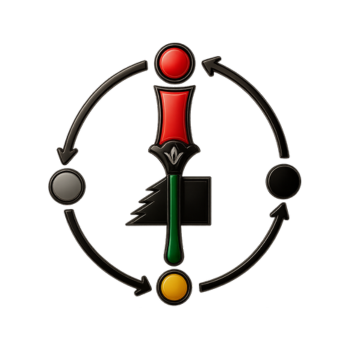-
Spirituality vs Religion
In Ancient Kemetic thought, there was Ra vs Apep and Heru vs Set. In Ancient Persia, Zoroastrianism described it as Ahura Mazda vs Ahriman. In Ancient India it was Krishna vs Shiva. In the Abrahamic religions, God has many names including Elohim, Yahweh, Jehovah, Jesus & Allah. And he always squares off against a Devil who likewise has many names i.e. Lucifer, Satan, Beelzebub, Azazel, Shaitan or Iblis. These were but myths used to describe the conflict between good and evil. But there came a point in history when Religious teachers told us that these beings were literal. As it pertains to Judaism, Christianity and Islam many still believe these beings exist. However, the African spiritual systems that inspired these religions tell us these are simply stories and concepts. Stories & concepts used to describe the war between our higher self and our lower self-i.e. good vs evil. Good and Evil are concepts based on morality and common sense.
One need only add or subtract a letter to or from either good or evil to over stand. Add a D to evil and you have your Devil. Likewise, remove an O from good and you have your God.
Kemetic spirituality shows us through the contention of Set & Heru that our higher self is always in conflict with our lower self. Heru a sky deity representing the higher self. While Set a chaos deity representing the lower self. When we transition from this earthly realm to the spiritual realm, we don’t join Ausar we become one with Ausar.
Religion teaches us that God is outside of ourselves. And through faith and belief, we can receive his blessings. And when die, we go to be with him in paradise. The difference being that African spirituality shows us that the Divine being is within us. No faith is required because it’s not about what we believe it’s about what we know. Know thy self and know God.
Piankhi Ptah Mutulu3 Comments-
 120,458
Abibisika (Black Gold) Points
120,458
Abibisika (Black Gold) Points
“African champions must break the chain that links African ideas to European ones and listen to the voice of the ancestors without European interpreters.”
– Nana Jacob Carruthers, Mdw Ntr -
I think complementary opposite or principles is how I see it.
But I think we can use them in both contexts especially when trying to express our thoughts to those still in a European mindstate. Due to them mostly only having that understanding, I hope that makes sense. -
I understand and its a common mistake on my part. I’d appreciate getting called out on it as a reminder to stop doing so.
-

